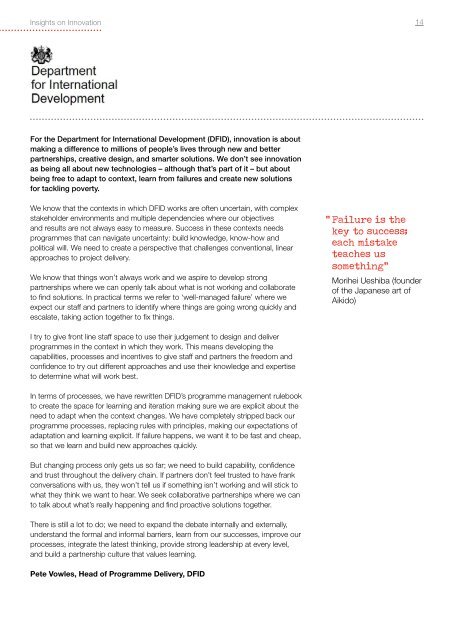O0YQ5
O0YQ5
O0YQ5
Create successful ePaper yourself
Turn your PDF publications into a flip-book with our unique Google optimized e-Paper software.
Insights on Innovation<br />
14<br />
For the Department for International Development (DFID), innovation is about<br />
making a difference to millions of people’s lives through new and better<br />
partnerships, creative design, and smarter solutions. We don’t see innovation<br />
as being all about new technologies – although that’s part of it – but about<br />
being free to adapt to context, learn from failures and create new solutions<br />
for tackling poverty.<br />
We know that the contexts in which DFID works are often uncertain, with complex<br />
stakeholder environments and multiple dependencies where our objectives<br />
and results are not always easy to measure. Success in these contexts needs<br />
programmes that can navigate uncertainty: build knowledge, know-how and<br />
political will. We need to create a perspective that challenges conventional, linear<br />
approaches to project delivery.<br />
We know that things won’t always work and we aspire to develop strong<br />
partnerships where we can openly talk about what is not working and collaborate<br />
to find solutions. In practical terms we refer to ‘well-managed failure’ where we<br />
expect our staff and partners to identify where things are going wrong quickly and<br />
escalate, taking action together to fix things.<br />
" Failure is the<br />
key to success;<br />
each mistake<br />
teaches us<br />
something"<br />
Morihei Ueshiba (founder<br />
of the Japanese art of<br />
Aikido)<br />
I try to give front line staff space to use their judgement to design and deliver<br />
programmes in the context in which they work. This means developing the<br />
capabilities, processes and incentives to give staff and partners the freedom and<br />
confidence to try out different approaches and use their knowledge and expertise<br />
to determine what will work best.<br />
In terms of processes, we have rewritten DFID’s programme management rulebook<br />
to create the space for learning and iteration making sure we are explicit about the<br />
need to adapt when the context changes. We have completely stripped back our<br />
programme processes, replacing rules with principles, making our expectations of<br />
adaptation and learning explicit. If failure happens, we want it to be fast and cheap,<br />
so that we learn and build new approaches quickly.<br />
But changing process only gets us so far; we need to build capability, confidence<br />
and trust throughout the delivery chain. If partners don’t feel trusted to have frank<br />
conversations with us, they won’t tell us if something isn’t working and will stick to<br />
what they think we want to hear. We seek collaborative partnerships where we can<br />
to talk about what’s really happening and find proactive solutions together.<br />
There is still a lot to do; we need to expand the debate internally and externally,<br />
understand the formal and informal barriers, learn from our successes, improve our<br />
processes, integrate the latest thinking, provide strong leadership at every level,<br />
and build a partnership culture that values learning.<br />
Pete Vowles, Head of Programme Delivery, DFID


